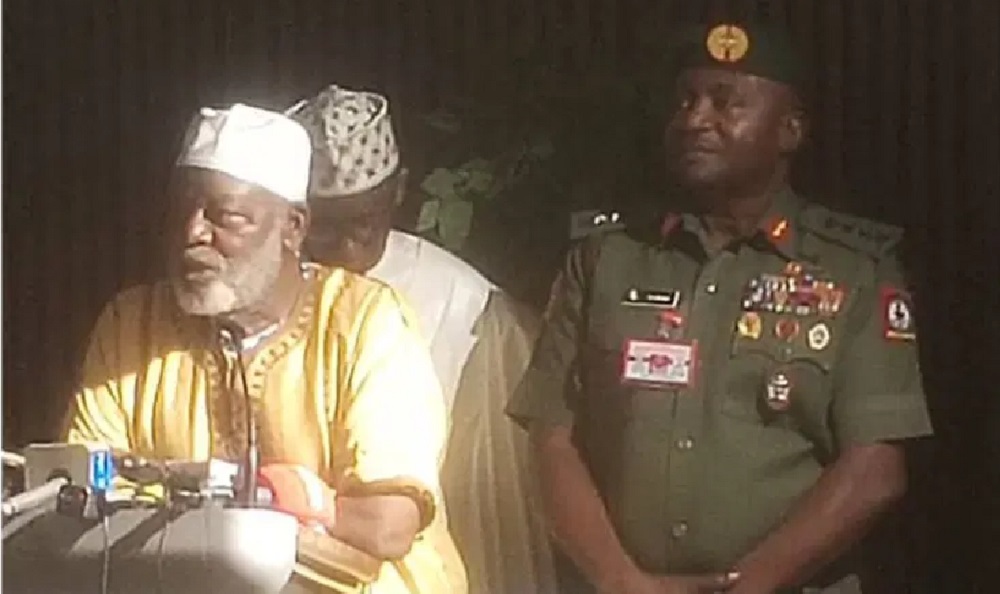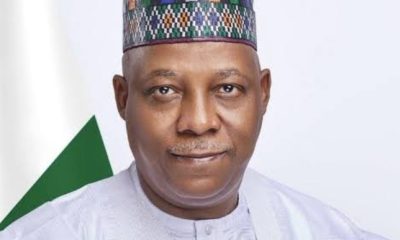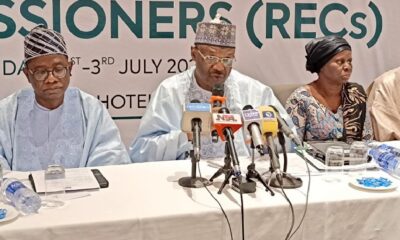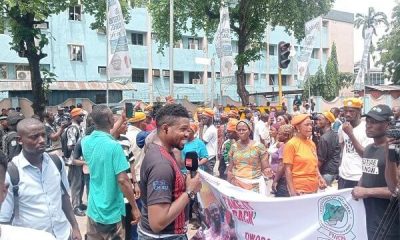News
Radio Regulations and Global Spectrum management

By Sonny Aragba-Akpore.
From January 1, 2025, a new radio regulation management takes root among the 193-member nations of the International Telecommunications Union (ITU)
This is a fall out of the 2024 resolutions of the ITU Radio Regulations,a result of a four-year process after four weeks of negotiations during the World Radiocommunication Conference (WRC-23), hosted 2023 in Dubai, United Arab Emirates.
The International Telecommunication Union (ITU) released on August 28,2024 an updated version of the Radio Regulations, the international treaty governing the global use of radio-frequency spectrum and satellite orbits.
The ITU Radio Regulations govern the global use of radio-frequency spectrum and satellite orbits for all radio services, systems and applications, including fixed and mobile broadband, satellite systems, sound and TV broadcasting, radionavigation, meteorological monitoring and prediction, space research and Earth exploration, amateur radio services and other topics.
“The 2024 edition of the Radio Regulations marks a significant milestone in the world of technology,” according to ITU Secretary-General Doreen Bogdan-Martin. “As technological progress advances and the demand for spectrum grows, the international treaty continues to evolve to accommodate new radiocommunication services and applications, minimize interference between services, and ensure equitable access to this essential resource.”
The treaty serves as the cornerstone of international radio frequency management, ensuring that spectrum allocations keep pace with the rapidly evolving technological landscape and meet the needs of modern communication systems.
The Radio Regulations are a four-volume treaty of more than 2,000 pages. The treaty establishes the rights and obligations of ITU’s 193 member states and now covers more than 40 different radiocommunication services, spanning frequencies from 8.3 kilohertz (kHz) to 3000 gigahertz (GHz).
The ITU Radio Regulations facilitate equitable access to and rational use of the radio-frequency spectrum and geostationary satellite orbits, both globally shared and limited natural resources; support the efficient and effective operation of all radiocommunication services; and, as necessary, facilitate the introduction and regulation of new radiocommunication services and technologies.
The international coordination mechanisms enshrined in the ITU-managed treaty promote its objective to ensure the availability of the frequencies provided for distress and safety communications and help prevent or resolve cases of harmful interference between the radio services of different administrations.
The 2024 Radio Regulations are available in all six UN official languages These are Arabic, Chinese, English, French, Russian and Spanish.
The correct interpretation and translation of these six languages, in both spoken and written form, is very important to the work of the Organization, because this enables clear and concise communication on issues of global importance.
The ITU said the Radio Regulations documents also available on electronic versions that can be downloaded free of charge while Print and DVD versions will be available for purchase in the coming weeks.
Treaty provisions also direct how radio equipment and systems must operate to ensure efficient and effective coexistence among various services worldwide and anywhere in space, optimizing the usage of today’s increasingly crowded airwaves.
The 2024 Radio Regulations identify new spectrum resources to support technological innovation, deepen global connectivity, increase access to and equitable use of space-based radio resources, and enhance safety at sea, in the air, and on land.
“The updated Radio Regulations is the result of hard-won agreements reached at WRC-23 and a testament to the unwavering spirit of cooperation and compromise among all of our members to negotiate timely changes to the international treaty,” said Mario Maniewicz, Director of the ITU Radiocommunication Bureau. “The updated treaty provides a framework for national spectrum management that aligns with international standards and guarantees the stable, predictable regulatory environment that is essential for the development of innovative radiocommunication services for all.”
Global regulation of the radio spectrum began with the signing of the first International Radio Telegraph Convention in Berlin on November 3,1906 after 30 states came together and agreed on key maritime communications and safety provisions and established “SOS” as a globally recognized distress signal.
The Radio Regulations, Edition of 2024, contains the complete texts of the Radio Regulations adopted by the World Radiocommunication Conference of 1995 (WRC-95) and reviewed by the subsequent World Radiocommunication Conferences: WRC-97 (Geneva, 1997), WRC-2000 (Istanbul, 2000), WRC-03 (Geneva, 2003), WRC-07 (Geneva, 2007), WRC-12 (Geneva, 2012), WRC-15 (Geneva, 2015), WRC-19 (Sharm el-Sheik, 2019) and WRC-23 (Dubai, 2023).
World radiocommunication conferences (WRC) are held every three to four years.
It is the job of WRC to review, and, if necessary, revise the Radio Regulations, the international treaty governing the use of the radio-frequency spectrum and the geostationary-satellite and non-geostationary-satellite orbits. Revisions are made on the basis of an agenda determined by the ITU Council, which takes into account recommendations made by previous world radiocommunication conferences.
The general scope of the agenda of world radiocommunication conferences is established four to six years in advance, with the final agenda set by the ITU Council two years before the conference, with the concurrence of a majority of Member States.
Under the terms of the ITU Constitution, a WRC can:revise the Radio Regulations and any associated Frequency assignment and allotment Plans; address any radiocommunication matter of worldwide character; instruct the Radio Regulations Board and the Radiocommunication Bureau, and review their activities; determine Questions for study by the Radiocommunication Assembly and its Study Groups in preparation for future Radiocommunication Conferences.
On the basis of contributions from administrations, the Radiocommunication Study Groups, and other sources is captured in Article 19 of the Convention (Geneva, 1992)) concerning the regulatory, technical, operational and procedural matters to be considered by World and Regional Radiocommunication Conferences, the Conference Preparatory Meeting (CPM) shall prepare a consolidated report to be used in support of the work of such conferences.
News
DHQ: Military operation rescued ex-NYSC DG, no ransom paid

The Defence Headquarters has dismissed claims that senior military officers contributed money to secure the release of a former Director General of the National Youth Service Corps, Brigadier General Maharazu Tsiga (retd).
The DHQ insisted that his freedom was achieved through sustained military operations and intelligence efforts.
Tsiga was abducted on February 6, 2025, in Tsiga, the Kafur District of Bakori Local Government Area, Katsina State.
A trending WhatsApp message by Brigadier General Ismaila Abdullahi claimed that some retired and serving military officers contributed money to pay the ransom demanded by Tsiga’s abductors.
The message further stated that the funds were paid into his account which was provided by Tsiga’s son, Kamal and thanked everyone who contributed.
However, in a statement issued on Monday, the Director of Defence Information, Brigadier General Tukur Gusau, described the claims by Abdullahi as “misleading” and “a calculated attempt to undermine the military’s dedicated efforts” to combat terrorism and rescue abducted citizens.
Gusau said troops of 17 Brigade responded within hours and launched a series of search-and-rescue operations under Operation Fansan Yamma, in conjunction with air components.
According to him, troops combed several hideouts across Katsina and Zamfara states, including Jeka, Areda, Zango, Ruwan Lafiya, Mununu, and Pauwa Hills.
He added that though no direct contact was made with the abductors initially, the operations led to the abandonment of rustled animals and captives by fleeing terrorists.
Gusau said, “It is important to note that the unfortunate abduction of the former DG of NYSC occurred in the wee hours of 6 February 2025, in Tsiga, Kafur District of Bakori Local Government Area in Katsina State.
” Immediately, troops of 17 Brigade were alerted; they responded to the situation around 0300 hours the same day and, in a commendable show of professionalism, swiftly went on pursuit in conjunction with the Air Component of Operation Fansan Yamma.
“These combined efforts led to troops combing the assailants’/bandits’ hideouts within Jeka, Areda, and Zango, all in Kankara Local Government Area, in search of the former DG. The operation extended to Ruwan Lafiya, Mununu, Matallawa and Bakkai in Faskari Local Government Area.
“Although no direct contact was made with the abductors, the troops successfully pressured the criminals, who abandoned rustled animals and some captives in their hasty retreat.
“The troops nevertheless sustained the pursuit of the terrorists with unwavering determination, despite facing difficulties due to challenging terrain.”
Gusau said intelligence-led air raids on Dunya Hill—a known stronghold of terrorists—disrupted the kidnappers and enabled the escape of several captives.
He noted that while Tsiga was unable to flee due to health complications, another captive, Barau Garba, a local teacher, was rescued and reunited with his family.
He further disclosed that 84 kidnapped victims were freed in a separate assault on Pauwa Hills and surrounding areas, with several bandits neutralised and three soldiers sustaining injuries.
He said, “On February 8, leveraging credible intelligence, troops intensified their manhunt for the abductors and conducted dawn attacks at Yankuzo and Gidan Dankaka in Tsafe Local Government Area of Zamfara State where terrorist kingpin Ado Aliero hibernates. More so, intelligence confirmed that he had links with the abductors. Unfortunately, the operations did not result in locating the terrorists.
“However, subsequent air operations at Dunya Hill, a suspected bandit stronghold where General Tsiga was held, disrupted the terrorists, leading to the escape of several captives. Regrettably, the former DG was unable to escape due to health concerns. One of the captives, Barau Garba, a teacher at Government Secondary School in Tsiga and who was with General Tsiga, was rescued by troops, and he shared his experience via the attached video.
“Barau has since been reunited with his family in Tsiga town. In another instance, troops assaulted Pauwa Hills and Matallawa area of Kankara Local Government Area in search of Brigadier General Tsiga.
“However, they were only able to rescue 84 kidnapped victims from the area without locating him. In the process, several terrorists/bandits were neutralised, while three personnel sustained gunshot wounds.
“Since Brigadier General Tsiga’s abduction on 7 February 2025, troops have remained relentless in their pursuit, conducting both air and ground operations within Danmusa, Kankara and Faskari Local Government Areas, where he was supposedly held captive at different times, and these operations kept pressure on the abductors.
“It is thus only fair to recognise the significant sacrifices made by these troops who have worked day and night, often at great risk to their own lives in their search of the senior officer. The disparaging online is, therefore, nothing but presumably an act of mischief which is calculated at undermining the dedicated efforts of a military effort to eradicate terrorists/bandits and other criminal elements from the North West region.’
DHQ emphasised that a mix of kinetic and non-kinetic strategies facilitated the release of the senior officer, reiterating that no ransom was paid.
He said, “It is noteworthy to add that the military operations comprising both kinetic and non-kinetic strategies facilitated the rescue of General Tsiga as his life is invaluable and anything that needed to be done to ensure he was safe was adopted in ensuring a successful search and rescue effort.
“Troops will continue to support all efforts in ensuring peace and security across the country. The general public is therefore encouraged to continue supporting troops by providing credible intelligence to assist in this regard.”
News
LG autonomy: Govs block council chairmen from opening CBN accounts

The challenges facing the implementation of the Supreme Court judgment on local government autonomy have assumed a new dimension, with some state governors explicitly warning their council chairmen against opening an account with the Central Bank of Nigeria for the direct payment of their allocations from the Federation Account.
The latest development represents yet another significant hurdle, nearly nine months after the Supreme Court granted full autonomy to the 774 local governments across the country, paving the way for direct payment of federal allocations.
As part of the Federal Government’s commitment to the Supreme Court judgment, a panel was set up to ensure the implementation of LG autonomy.
In line with its recommendation, the panel directed the Central Bank of Nigeria to open accounts for the 774 LGs for direct payment of their allocation.
This process has, however, faced delays with the CBN and LGs trading accusations.
The immediate-past Account-General of the Federation, Oluwatoyin Madein and the Attorney-General and Minister of Justice, Lateef Fagbemi, SAN, and other officials recently commenced talks on the modalities for the LGAs to open accounts with the CBN for direct allocation but are reportedly facing challenges identifying LGAs with democratically elected officials.
A Federation Account Allocation Committee Technical Sub-Committee meeting revealed that only Delta State LGAs had submitted their account details.
Amid the controversy, fresh investigations by The PUNCH on Monday revealed that some governors have resorted to intimidation and coercion, pressuring their local government chairmen to refrain from opening the designated accounts for direct allocation payment.
Several local government chairmen who spoke with our correspondents on the condition of anonymity, out of fear of victimisation, said their respective governors have instructed them not to open accounts with the CBN for the direct receipt of their allocations.
One chairman revealed that a governor in the South-East region refused to accept 50 percent of the monthly allocations, which was part of the agreement intended to facilitate the opening of the accounts for direct payment.
“Our governor has threatened us (all the chairmen in the state) not to open accounts with the CBN for the direct payment of our allocation”, one of the chairmen of South-East states, who pleaded anonymity, told one of our correspondents.
“We even tried to beg him, seeking to strike a deal, such that if he allows us to open the account with the CBN and our allocations are paid directly, we will remit 50 per cent of the LG allocation to him monthly, but he disagreed. So, this is where we are for now,” the LG chair added.
Further investigations reveal that a significant number of governors are strongly opposed to the opening of CBN accounts, fearing it would sever their long-standing access to local government funds.
However, a negligible number of governors are said to be disposed to the idea of their LGAs opening the CBN accounts.
The PUNCH had reported how some governors met with President Bola Tinubu recently and said they preferred the LGs to open accounts with commercial banks instead of the CBN.
It is unclear if the President is positively disposed to the idea.
Meanwhile, another LG chair, who spoke to The PUNCH on the condition of anonymity, explained that the CBN’s stringent conditions might be one of the reasons the governors were not positively disposed to the idea, aside from the fact that it will cut off their access to LG funds.
A chairman in one of the local government areas in South-West disclosed that the council chairmen in the state have not opened accounts with CBN due to the stringent conditions set by the apex bank.
The chairman said one of the stringent demands is the submission of a two-month statement of account from each local government area, which was not available.
“But as simple as that condition may look, all council areas here in our state can’t meet up. The situation is not peculiar to our state. If you check well, most states can’t meet up simply because their governors are the ones spending their allocation.
“They are only giving those in LGAs whatever they feel like giving them. That is the problem,” the LG boss said.
Other local governments have cited various reasons for the delay in opening CBN accounts. One council chairman in Benue State, who spoke to our correspondent on the condition of anonymity, alleged that certain parties are working together to hinder the process.
He said, “Chairmen across the country are aware that state governors are trying to frustrate the financial autonomy of local government areas. What they are pushing for is for council chairmen to open their accounts in commercial banks where they can easily have access to control the councils’ money.
“They know that the moment the money is paid to CBN, it will go directly to us, and they will not have access to it. So, that is the reason the governors are frustrating the move.”
However, the Nigerian Union of Local Government Employees in Nasarawa State has said it is fully compliant with the directive to open accounts and is prepared to receive funds from the Federal Government.
The NULGE Chairman in the state, Adamu Sharhabilu, who disclosed this to our correspondent in Lafia on Monday, revealed that the state government and the House of Assembly have been working in collaboration with local government workers to ensure that local government autonomy is fully realized in the state, showing a unified effort to support the implementation of the Supreme Court’s ruling.
He noted, however, that despite the cooperation at the state level, the local government councils have yet to begin receiving their allocations directly from the Federal Government
The NULGE chair said, “As I speak with you, all the LG accounts had been opened because we thought that the Federal Government will send our money there, but up till this moment, no LG in Nasarawa State has received allocation directly from the FG.
“For now, there are no obvious plans by the Nasarawa State government to short-change the local government workers or frustrate the LG Autonomy implementation in the state. From our own observation, the governor has been working towards ensuring that local government workers get what is due to them and also enjoy all the benefits of the LG autonomy.
“The monthly allocations are usually sent to the Joint Accounts under the State Ministry for Local Government and Chieftaincy Affairs. No local government has received funds from the Federation Account.’’
However, another local government chairman in the state, speaking anonymously, attributed the delay to the government’s failure to follow through on its promises.
The official stated, “What we are facing now is the fault of the Federal Government because the federal allocation committee is supposed to send the money straight to the local governments, not the joint account. We have so many accounts to receive the money, but they refused to send the money to the local government coffers.”
He, therefore, urged the Federal Government to align itself with the Supreme Court’s judgment and allow for the full implementation of the LG autonomy by ensuring that the funds are paid directly to the LGAs.
Findings showed that many state chairmen are unaware of the current stage of policy implementation.
The Chairman of the Nigeria Union of Local Government Employees, Kwara State chapter, Seun Oyinlade, hinted that no council has opened an account with the CBN.
Speaking on the phone on Monday, Oyinlade said, “We are not aware that any of the 16 local government councils in the state have opened an account with the CBN. We do not know if the local government councils in the state operate an account with the Central Bank of Nigeria.”
He said he could not confirm if the state governor was similarly opposed to the direct payment of allocation to the councils.
“Though we heard it as a rumour that governors are trying to frustrate the implementation of the local government autonomy, we are yet to verify the claim. We will confirm if the local government councils have accounts with the CBN when allocation from the Federation Account is paid to them,” he said.
A local government worker in Damaturu, Yobe State, revealed that March salaries were paid through the Ministry for Local Government and Chieftaincy Affairs, rather than directly from the local governments’ accounts.
He said, “This is a setback in the implementation of the Supreme Court’s ruling aimed at granting more autonomy to local governments.”
“Even the new minimum wage implementation, local government staff members are yet to benefit from it. The state civil servants have benefited from the new minimum wage approved by the Federal Government. This development has brought some relief to state employees.”
In Zamfara, local government chairmen confirmed that they have yet to open accounts with the CBN.
The state’s ALGON chairman, Alhaji Samaila Moriki, who also serves as the chairman of Zurmi Local Government Area, told The PUNCH that they were still awaiting further instructions before proceeding with the opening of accounts.
He said, “We have yet to open accounts with the CBN because we are waiting for further directives and instructions. Everything is done through due process, and we are waiting for the directives from above. So, that is why we have yet to open accounts with the CBN. We will do that later when things become normal.”
He, however, declined to make further comments on the directives and instructions they were waiting for.
Furthermore, the 44 local government councils in Kano State have yet to open an account with the CBN.
The chairman of Garko LGA, Saminu Garko, confirmed this, stating, “None of the 44 local government councils in the state has opened accounts with the Central Bank of Nigeria. But we heard that the apex bank has opened an account for all local governments, and what remains is to regularise the accounts.
“Moreso, the Central Bank of Nigeria has not invited any of the local government chairmen in the state for the regularisation of the accounts, let alone verification of signatories.
‘’We just read in the newspapers that the bank is inviting local government chairmen for the verification exercise.”
He noted that since the Local governments have not opened the accounts with the bank, there was no way the chairmen could be invited for the verification of signatories.
But the ALGON in Jigawa State denied that the governor threatened local government chairmen against opening accounts with the CBN.
The ALGON state chairman, Prof. Abdulrahman Salim, assured that the account opening process is ongoing. “Everything is okay, and our local government areas are still visiting the CBN state headquarters to complete the necessary procedures,” he explained.
Salim added that “All 774 local government councils, including the 27 in Jigawa State, are expected to open dedicated accounts with the CBN for direct disbursement of funds from the Federation Account as we were directed.
“Jigawa State’s 27 local government areas are taking steps to open CBN accounts, which will enable them to receive direct allocations and manage their finances independently.”
“The CBN has been instrumental in facilitating local government autonomy by providing a platform for local governments to open accounts and receive direct allocations,” he stressed further.
“The delay in opening CBN accounts has been attributed to administrative bottlenecks, including the failure of the apex bank to fix a date for the biometric data capturing to complete the process.”
He claimed that nearly all the necessary steps had been completed, with only biometric capturing remaining for some local governments, adding that “the chairmen are currently waiting for the CBN to schedule a date for them to revisit the office for biometric data capturing.”
The NULGE leadership in Jigawa State could not be reached to confirm Salim’s claims.
However, a NULGE official, who spoke on condition of anonymity, quipped, “It will not come to us as a surprise if governors really don’t want the local government autonomy, they can change the process entirely.”
Credit: PUNCH
News
Trade war: Trump threatens additional 50% tariffs on China

US President Donald Trump threatens steep additional tariffs on Chinese imports if Beijing does not drop its retaliation plans, adding that Washington is open to negotiations with other countries.
“If China does not withdraw its 34 percent increase on top of their long-standing trade abuses by tomorrow, April 8, 2025, the United States will impose ADDITIONAL tariffs on China of 50 percent, effective April 9th,” Trump writes in a Truth Social post.
Earlier, Israeli Prime Minister Benjamin Netanyahu arrived at the White House, where he met with Trump, becoming the first foreign leader to personally plead for a reprieve from stinging US tariffs that have shaken the world.
Also, UK Prime Minister Keir Starmer said that the global economic consequences of US President Donald Trump’s tariffs “could be profound”.
Speaking at the Jaguar Land Rover factory in Birmingham on Monday, Starmer reaffirmed the UK-US alliance as “special” and “close”, adding that “we have to step up. We can’t be cowed” by US tariffs.
Similarly, Mexican President, Claudia Sheinbaum, said that her country, which is the top US trading partner and has been hit by tariffs on its automobiles, steel and aluminum, will “not rule out” imposing reciprocal tariffs on US goods.
The New York Stock Exchange as Wall Street stocks traded mixed late morning amid speculation the market may be bottoming out following steep losses triggered by President Donald Trump’s sweeping tariff announcements.
AFP
-

 News20 hours ago
News20 hours agoAPC opens up over alleged rift between Tinubu and his deputy, Shettima
-

 News15 hours ago
News15 hours agoJust in: Presidency Insists INEC Chairman, Yakubu Not Sacked
-

 News20 hours ago
News20 hours agoVeteran comedian opens can of worms, says I ‘ve caught many of my friends wives flirting with big men, govs
-

 News16 hours ago
News16 hours agoJUST IN: Police Nab leaders of April 7 nationwide protest
-

 News20 hours ago
News20 hours agoIn Burkina Faso we’re not in a democracy, but in a revolution, No Country develops in democracy” ~ Captain Ibrahim Traore.
-

 News15 hours ago
News15 hours agoJust in: Saudi Arabia Suspends Visa Issuance to Nigeria, 13 Other Countries
-

 News15 hours ago
News15 hours agoFG Orders NYSC To Stop Early Morning Drills For Corps Members
-

 Economy20 hours ago
Economy20 hours agoSEE Black Market Dollar To Naira Exchange Rate In Lagos, FCT, April 7th 2025





